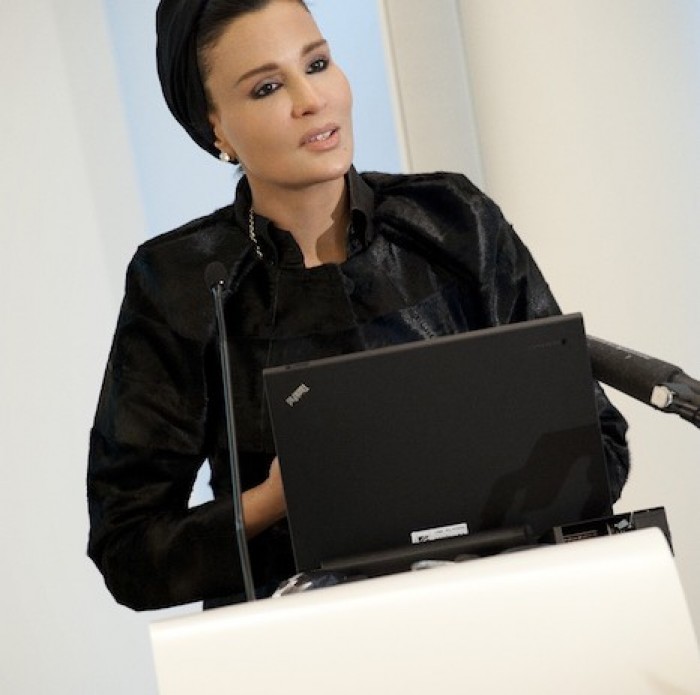Carlos Slim Helu: Back home in Lebanon after 46 years
Within days of being named the world's richest person by Forbes magazine, Carlos Slim Helu returned to Lebanon, the land of his ancestors, 46 years after his first visit. This Mexican billionaire businessman of Lebanese ancestry recently jumped past Microsoft founder Bill Gates and investor Warren Buffett to become the world’s richest man, with an estimated fortune of $53.5 billion, and daily earnings of almost $30 million. The trip of Carlos Slim Helu to Lebanon came by invitation from the Maronite Foundation in the World. Awaiting Slim was a week full of excitement – a week that included business and social meetings, cultural exchanges, and an emotional discovery of his ancestral land.
This family man, whom the head of the Jezzine Municipal Union Saeed Abu Akl described as “one of our greatest persons,” has set an example of humility for future generations. Despite his head-spinning wealth, this low-key billionaire represents morals, education, hard work and ambition.
The fifth of six children, Carlos Slim Helu, born on the 28th of January 1940 in Mexico City, comes from a family who ran successful small businesses in Mexico City. His mother, Linda Helu, came from a distinguished family of Lebanese origin who brought the first Arabic printing press to Mexico in the 19th century. His father, Julian Slim Haddad, left Lebanon to Mexico in 1902 in order to avoid conscription into the Ottoman army, and built a fortune from running a general store during the 1910 Mexican Revolution.
Today, the world’s new richest man owns controlling interests in at least 222 different companies, including leading American businesses such as Saks, Citigroup, New York Times and others.
It has even been estimated that his firm accounts for a third of Mexico’s leading stock market index and 7% of Mexico’s annual economic output! This is staggering by any standards. It’s no wonder that Mexico is often referred to as ‘Slimlandia’ by Mexicans themselves. After all, they are born in Slim's hospitals, drive on his Tarmac, smoke his tobacco, build their houses from his cement, eat in his restaurants, talk on his phones and sleep in bed linen made in his factories.
Slim owes his fortune to a resolutely "Old School" technique – buy companies cheap, turn them around and then drive the competition out of the market. Then he buys again. He has been the master of the fire sale, swooping in to snap up bargains in the midst of panics and sell-offs.
Slim attributes much of his success to his father, who set up a dry goods store and then invested the profits in property during the Mexican Revolution. He gave all his children a ledger and taught them how to keep track of simple financial transactions. Slim took that lesson to heart. By 11, he was investing in government saving bonds; by 15, he had bought a small shareholding in Mexico's biggest bank, Banco Nacional de México. He studied civil engineering at university and kept his passion for math going by teaching algebra on the side. Upon graduation he became one of a clique called "Los Casabolseros" or "the stock market boys", young wheeler-dealers in the nascent world of the Mexican stock market.
By the time he was 26, Slim’s net worth was estimated at over $40 million! The young and ambitious businessman struck gold during Mexico's 1982 recession when he began to acquire businesses at rock bottom prices. In 1990, he received his second big break when Mexico’s national telecommunications company, Telmex, was privatized and Slim was able to beat out France Telecom and American telecommunications giant Southwestern Bell to snatch it up. Telmex now operates approximately 90 percent of Mexico's telephone lines while its mobile phone network is the largest in Latin America.
Despite his staggering wealth, Slim still lives relatively modestly, reflecting a down-to-earth side not common among most other billionaires. He lives in a modest six-bedroom home, luxurious by the standards of his fellow countrymen yet somewhat small when compared to those of other successful Mexicans. In fact, he does not spend much of his wealth, and indeed is still known to drive a hard bargain for day-to-day things. “When I die, I will not take anything with me; my family is my most important possession,” said Slim, who still values his weekly family communal meal. He married the love of his life, Lebanese-Mexican Maronite Christian Soumaya Domit Gemayel, and together they raised six children. After her death in 1999, Slim built an art museum in his wife’s memory and named it after her.
Visiting Lebanon
On March 11, 2010, top Lebanese officials including President Michel Sleiman, Prime Minister Saad Hariri and Parliament Speaker Nabih Berri welcomed Slim, his sons, Carlos Jr. and Patricio, and the bishop of the Maronite church in Mexico, Patriarch George Abi Younes, upon their arrival to Lebanon. The following day, President Michel Sleiman and First Lady Wafaa Sleiman organized a dinner at the Presidential Palace in Baabda to present Slim with the Golden Medal of Honor. Following this event, President Sleiman called for strengthening of ties between Lebanon and its emigrants and for encouraging investment in the country. Slim, in turn, commended the progress made in reconstructing Lebanon, adding he was ready to contribute to several projects.
Slim participated in the mass celebration held by Maronite Patriarch Mar Nasrallah Boutros Sfeir at Bkerké on Sunday the 14th. The mass was followed by a luncheon with Patriarch Sfeir, political and social figures, and a number of Lebanese businessmen including Carlos Ghosn and Gilbert Chaghouri. Sfeir praised Slim’s achievements during his sermon and reminded everyone that money and material wealth should be accompanied by charity and good deeds. The deputy president of the Maronite Foundation in the World, Nehmat Frem, also gave a speech, saying that the Lebanese have been able to succeed wherever they go without forgetting their homeland. Slim, on his part, said that he was happy to be in Lebanon, a country that he had come to love.
On Monday, Slim visited Jezzine, his hometown in south Lebanon, and the house that was once owned by his grandfather. Slim was received by Samir Azar and Antoine Al-Khoury, acting south Lebanon Governor Nicolas Abu Daher, Sidon and Deir al-Qamar Roman Catholic bishop Elie Haddad, the head of the Jezzine Municipal Union Saeed Abu Akl, as well as members of the Slim and Helu families and villagers. After holding prayers near Jezzine’s Notre Dame Statue, Slim walked to the town’s Municipal Palace court where he was greeted by local crowds. Abu Akl praised Slim and conferred him the Honorary Citizen of Jezzine Certificate.
After receiving an exquisite handcrafted cutlery set made in Jezzine as a gift from the town’s Merchants and Craftsmen Association, Slim addressed the crowd, voicing his happiness that he was back in the town that his father left 100 years ago, and which he stressed he would take care of. "The joy and hope I saw in the eyes of children and young people brought joy and happiness to my heart. We must work together hand in hand, residents and expatriates, for the advancement of our country and the prosperity of Lebanon, especially beloved Jezzine, for the sake of a better future for these children and young people," Slim said.
Bishop Haddad greeted him and praised the role that expatriates play in shaping Lebanon’s future. “Expatriates are doing right by reconnecting with Lebanon, and precisely with this region that will only flourish with their help. We welcome Carlos Slim in Jezzine; this is his home,” Haddad said.
Meanwhile, Khalil Al-Asmar, 85, who knew Carlos's father from his visit to Jezzine in 1938, said he hopes that Slim's visit will bring good luck to Jezzine. "God has blessed and honored him, and we hope he will honor Jezzine with a project that will bring employment opportunities to our children."
On Wednesday March 17th, Member of Parliament Streda Geagea and other dignitaries from Bsharri welcomed Slim as he toured the landmark sites of the town and visited the Gibran Khalil Gibran Museum and burial site. Slim promised to work on electronically archiving the contents of the Gibran Khalil Gibran Museum, thereby making them available to young people worldwide online. Geagea hailed the achievements of Slim, saying, "Carlos Slim's achievements are a pride for Lebanon and for all Lebanese citizens."
After touring Lebanon and visiting its historic sites, Slim returned to Beirut where he gave a lecture titled 'The new civilization of knowledge and technology' in which he spoke about his successful career and business experience spanning over 50 years. The lecture took place at the Suliman Olayan School of Business at the American University of Beirut, where hundreds gathered to listen to his speech. Slim drew on his personal experience in business management to offer advice on how to manage public debt and invest in infrastructure such as telecommunications, energy, water, electricity, ports, transportation and airports. He also spoke of the importance of privatization and the need to invest in projects which would provide job opportunities for Lebanese youth, allowing the revival of the middle class. He urged attendees to embrace knowledge, to follow their dreams, and to work in Lebanon rather than emigrate. “Lebanon is a promising country for development,” he said. “Education is the lifeblood of society, while a strong economic activity can create jobs. The way to end poverty is to create jobs, jobs, and more jobs."
When asked by Today’s Outlook what his advice to the Lebanese youth is, Slim replied: "Keep building your knowledge, and always live without fear and guilt; as fear is the worst feeling a person can have!”
Before his departure Slim described his trip to Lebanon as “very emotional”. “People have been great to us. We were so lucky. We'd be happy to visit again,” said his son Patricio to Today’s Outlook.
































